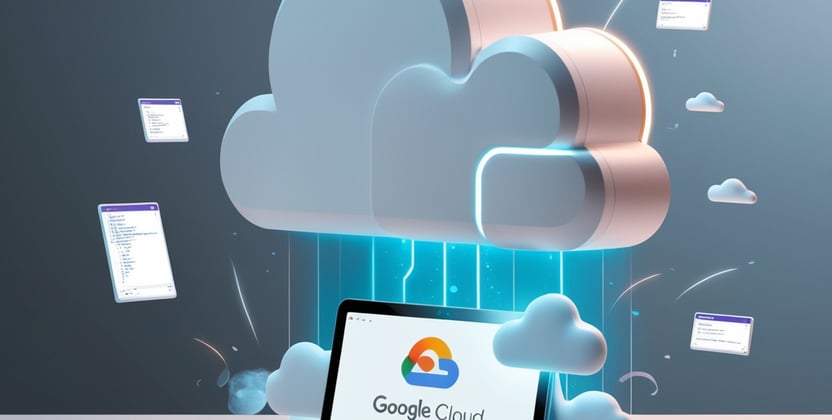Why Learning Data Engineer (GCP) a Valuable Choice?
Before diving into the topic, let’s start with a brief introduction to Google Cloud. Google Cloud is a suite of cloud computing services offered by Google, built on the same infrastructure that powers Google’s own products like Search, Gmail, and YouTube. It provides a wide range of hosted services, including computing, storage, networking, big data, machine learning, and IoT, along with tools for cloud management, security, and application development.
Biswaranjan


How to Become a GCP Data Engineer and Why Pursue This Path?
Cloud computing is transforming industries, and data engineers play a critical role in this digital revolution. Among the leading cloud providers—GCP, AWS, and Azure — Google Cloud Platform (GCP) stands out, especially for data engineering roles. Let’s explore the path to becoming a GCP Data Engineer, the required skills, and why GCP is an excellent choice.
1. How to Become a GCP Data Engineer
Becoming a GCP Data Engineer starts with either a relevant educational background like Computer Science or by gaining experience through certifications and hands-on learning. Key certifications include the Google Cloud Professional Data Engineer credential, which validates your skills in designing, building, and managing data processing systems on GCP.
Aspiring engineers should also gain practical experience with cloud-native tools such as BigQuery, DataFlow, Pub/Sub, and Cloud Storage. Online resources from Coursera, Udemy, and Google’s own learning platform provide excellent opportunities to master these tools.
2. Why Become a GCP Data Engineer
Cloud data engineers are in high demand due to the increasing adoption of cloud technologies across industries. As organizations shift their data infrastructure to the cloud, GCP-certified professionals are positioned to secure highly rewarding roles. Furthermore, the dynamic nature of this field ensures continuous learning and career advancement opportunities, making it a future-proof career.
3. Minimum Skills Required
To succeed, you need to be proficient in core GCP technologies like BigQuery and DataFlow. Strong programming skills in Python, SQL, and Java/Scala are crucial for building data pipelines and performing complex data transformations. Understanding data processing frameworks like Apache Beam and Kafka is also essential. Additionally, familiarity with DevOps practices like CI/CD and containerization (using Docker and Kubernetes) is increasingly valuable for modern data engineers.
4. Why Choose GCP Over AWS or Azure?
When it comes to data engineering, GCP offers several advantages over AWS and Azure:
Data-First Focus: GCP was built with data and analytics as core features, offering industry-leading tools like BigQuery for seamless data analysis.
Cost Efficiency: GCP often provides better pricing models, particularly in data storage and processing compared to AWS and Azure.
User-Friendly Interface: It’s often regarded as easier to navigate, making it more accessible for beginners.
Advanced Machine Learning Tools: With Google’s AI expertise, GCP has superior AI integration, such as Vertex AI for data-driven insights.
5. Advantages of Becoming a GCP Data Engineer
GCP Data Engineers typically earn higher salaries due to their specialized skill set and the growing demand for cloud-native data solutions. The career offers job security and global opportunities, with companies worldwide seeking to migrate to or expand their GCP infrastructure. Moreover, the ever-evolving cloud landscape ensures you’re always working with cutting-edge technologies, particularly in the fields of AI and machine learning.
In summary, pursuing a career as a GCP Data Engineer opens doors to high-paying roles, continuous learning, and job security in a rapidly growing field. Whether you’re just starting or looking to specialize further, the opportunities in this space are endless.
What is Google Cloud?
Google Cloud is a suite of cloud computing services provided by Google that runs on the same infrastructure Google uses internally for its end-user products like Google Search, Gmail, and YouTube. It includes a range of hosted services for computing, storage, networking, big data, machine learning, and the Internet of Things (IoT), as well as tools for cloud management, security, and application development.
The core components of Google Cloud include:
Google Compute Engine - Virtual machines and containers for running applications.
Google Kubernetes Engine (GKE) - A managed environment for deploying containerized applications.
Google Cloud Storage - Secure and scalable object storage for data.
BigQuery - A serverless data warehouse for analytics.
AI and Machine Learning Tools - Pre-built APIs and services for natural language processing, vision, and more.
Cloud Functions - Event-driven serverless computing.
How Does Google Cloud Benefit Businesses?
Scalability and Flexibility
Businesses can scale resources up or down based on demand, avoiding the need for upfront investment in hardware.
Support for hybrid and multi-cloud deployments allows businesses to choose their preferred cloud environment.
Cost Efficiency
Pay-as-you-go pricing ensures businesses only pay for what they use, minimizing costs.
Sustained use discounts and committed use contracts offer further savings.
Enhanced Performance
Google’s global network ensures low latency and high-speed connections.
Advanced data centers with cutting-edge hardware optimize workload performance.
Data and Analytics Capabilities
Tools like BigQuery provide real-time data analytics and insights.
Machine learning APIs allow businesses to integrate AI-powered features such as sentiment analysis, image recognition, and speech-to-text in their applications.
Security and Compliance
Google Cloud offers enterprise-grade security, including encryption by default and robust identity management.
Compliance certifications (e.g., GDPR, HIPAA, PCI DSS) help businesses meet regulatory requirements.
Innovation and Automation
Cloud AI and ML tools enable businesses to innovate with predictive analytics, recommendation systems, and chatbots.
Serverless technologies simplify development and deployment, freeing up teams to focus on core business functions.
Collaboration and Productivity
Integration with Google Workspace (formerly G Suite) allows seamless collaboration using tools like Google Drive, Docs, Sheets, and Meet.
Real-time collaboration boosts team efficiency and communication.
Sustainability
Google Cloud is carbon-neutral and committed to operating on 100% renewable energy, aligning with corporate sustainability goals.
Use Cases
E-commerce: Scalability during peak shopping seasons.
Healthcare: Secure storage and analysis of patient data.
Retail: Personalized shopping experiences using AI.
Finance: Real-time fraud detection.
Gaming: Hosting large-scale multiplayer environments.
By leveraging Google Cloud, businesses can achieve greater agility, reduce IT overhead, and focus on delivering value to their customers.
Who Can Join the GCP Cloud Data Engineer Training at CloudSkills Academy?
The GCP Cloud Data Engineer Training at CloudSkills Academy is meticulously crafted to empower individuals with the skills and expertise needed to excel in cloud-based data engineering. Whether you’re starting your career in data or looking to advance your existing skills, this training is your gateway to mastering Google Cloud’s data tools and technologies.
Here’s a closer look at who will benefit the most from our GCP Cloud Data Engineer Training:
IT Professionals: Developers, data engineers, and architects aiming to specialize in Google Cloud technologies.
Data Enthusiasts: Aspiring data analysts and engineers looking to build expertise in data pipelines, transformations, and BigQuery.
Cloud Computing Professionals: Individuals who want to expand their knowledge and capabilities in managing data in the cloud.
B.Tech and IT Students: Engineering and IT students seeking to enhance their resumes with cutting-edge cloud data engineering skills.
Non-IT Professionals: Individuals transitioning into the tech industry who want to harness the power of data and cloud computing.
Job Seekers and Career Changers: Those aspiring to secure high-paying, in-demand roles in the field of data engineering.
Business Analysts and Administrators: Professionals looking to leverage cloud-based data analytics for better decision-making.
No matter your current role or background, if you’re passionate about managing and analyzing data on the cloud, this program will set you on a path to success as a GCP Cloud Data Engineer.
Stop Overthinking!
Click the Enroll Button below and take the first step for your future!
Copyright © 2025 CloudSkills Academy
Quick Links:
|
|
|
+91 9642820071
cloudskillsacademy9@gmail.com
|
